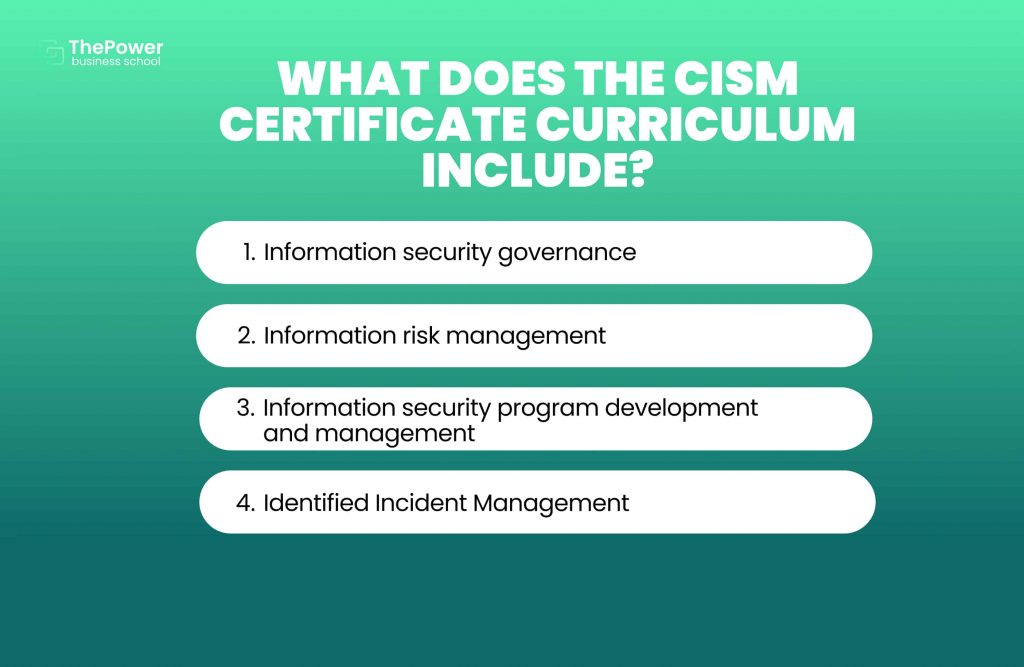CISM: everything you need to know about IT security

Franco Brutti
Staying safe is a basic need of any living being. And security is involved in every possible area, and clearly even in Internet security.
However, maintaining a stable and reliable level of security in the digital world is not an easy task. For this, there are professionals in charge of computer security, who in addition to offering their services to a company, can also do it privately.
But is there any kind of career or training in computer security? More than a career, a certification of great prestige as it is the CISM.
And what exactly is the CISM? Well, if this is of interest to you, then you can't miss the following informative article. You will leave here with more knowledge and, perhaps, with the desire to become certified in computer security.
Are you interested? Let's get started!
What is CISM?
CISM is the acronym for Certified Information Security Manager. And it’s a rather unique certificate, as it demonstrates the ability of a professional in the area of information security in any work environment.
This certification is offered by a non-profit information and risk management corporation called ISACA.
The certification offered by the Information Systems Audit and Control Association is recognized worldwide.
For this, there are many people who, every year, demonstrate their interest in participating in this test to demonstrate their worth and their knowledge in the practice.
But what does this certificate actually prove? Or rather, what kind of knowledge or preparation is it that is endorsed in the person who manages to achieve the title?
Well, nothing more and nothing less than:
The ability to be able to design, implement and manage any type of information security program or activity.
In other words, the ultimate goal of this certificate is applied, of course, in the most effective way possible to maximize results.
What are the benefits of becoming CISM certified?
Beyond the knowledge that this certificate offers, which is already many and with a lot of merits, this certificate offers, in turn, a lot of benefits at personal, work, and professional levels.
1. Revalues your work as a professional
One of the most outstanding benefits of this certificate is that your value as a professional in the tech world will grow like never before.
Companies are constantly looking for personnel trained in IT security issues, so they will not hesitate to hire people trained in this area.
And when it comes to CISM certification, this triples. Not just anyone can create and implement a new software security architecture, so if you are capable, you will be highly valued in the area.
2. Secured Security System Skills
The CISM certification is not only about passing a test, which in itself is complicated and you must demonstrate what you know in the subject.
It also involves a development process and work experience of up to 5 years, as if it were a university degree.
So, the moment you receive your certification, it’s because you will be in full capacity to demonstrate an impeccable ability in security systems.
You can almost assure any company that they are hiring a staff of great commercial and professional value.
What elements make up a CISM education?
One of the most common questions regarding this training is about its curriculum and what you will learn in it.
And although it’s quite clear that it’s a certification in computer security, it’s never too much to know in more detail what you will learn.
So, within the elements that make up the CISM training, you'll find:
Information security governance
This main element of the CISM refers to the imperative need to cover and secure the members of a society from possible attacks to its integrity through digital security.
For this reason, through this department, the necessary knowledge will be implemented so that the student in question can prepare himself for his functions in security strategies.
In this first syllabus, you will start with a learning-oriented to:
Implementation of security strategies.
Construction of a frame of reference on which the security program programmed to be applied is based.
The union of the governments conformed by the corporate or managerial personnel, and the security personnel to be able to devise strategies that successfully realize the concretion of objectives.
The evaluation of all the factors of the workspace, both internal and external, in correlation with the assets of a corporation in order to elaborate and implement security strategies successfully.
The roles of each member trained in security matters, in addition to including some necessary responsibilities in the work team to protect the integrity of the company's data and personal data.
Enabling the learner to engage all members of a company in the achievement of the objectives. It also takes into account those who are most interested in the project.
The effectiveness indicators of the security program in question.
Information risk management
At this point of the training, the aim is to learn everything related to the care and protection of company and customer information. The aim of the module is to avoid taking any risks that are not necessary or not worth taking.
To exemplify this point more explicitly, the following characteristics or elements can be determined:
Information assets are of great importance and are therefore identified and classified in order to protect and secure them as well as possible.
Every organization, corporation, or company has legal obligations before the law. It’s for this reason that a CISM certificate must contain all the knowledge necessary to identify that the company in question is complying with all the standards required to work legally and securely.
Periodically, a CISM professional must perform a risk assessment, analyzing all types of mitigation measures in addition to the vulnerabilities that the company or client may be suffering in their project.
All risk management should also be integrated into the negotiation and information technology processes. This, with the purpose of ensuring that the company is as safe as possible at all times and does not suffer any type of hacking that compromises its integrity and that of its clients.
It must have a plan of anticipated response to possible problems or risk situations that have been identified in the evaluation of the status.
Each risk that has been identified must be constantly monitored to identify any type of change that may occur.
IT security program development and management
The next point to be addressed has to do with the execution of the computer security program and how it is managed to meet the objectives.
Several aspects of great importance will be taken into consideration, such as the following:
The security action program will need to be aligned with the company's objectives. For this, it will be necessary for the CISM professional to carry out a previous study of those objectives and to build an action program based on those objectives.
The program should also be developed according to the company's available resources, in order to avoid obstacles that may arise due to lack of resources.
The company's software architecture must be stable and the software itself must have been previously maintained. This will make the execution of the program much cleaner and more efficient.
The established computer security program must comply with the policy required and learned during the years of training of the CISM. In this sense, the CISM professional must define if these requirements are being fulfilled in the procedures.
Defining the training plan and creating awareness in the work team about the importance of information security.
Integrating the security requirements for the implementation of the action plan.
Integrating in turn, the security requirements to third parties that have access to the company's information.
Monitoring at all times that the security program is being executed successfully and is delivering the expected results.
Management of identified incidents
Once the information security action program has been implemented and is under development, the monitoring process must be carried out. So you will be in the final phase of your work as a CISM professional.
Define if there are any problems or any type of information security vulnerability. Once identified, they are classified and communicated to the work team to provide the required follow-up.
It ‘s time to apply the response plan to possible incidents that were developed in the previous point of study.
The first step is to identify incidents that may be present in the program.
In the event that incidents are identified in the program, a thorough investigation should also be conducted to identify their causes. Basically, comply with the CISM legal statute.
The incident action plan should have an incident awareness talk so that the team is not only aware of incidents but also works towards their resolution.
Monitor and evaluate whether the follow-up given to incidents is proving to be effective and therefore, the problems are being solved.

How to obtain the CISM certificate?
Now that you know all the necessary requirements you will need to learn in order to fully master this type of work and its methodology, it’s time for you to learn about the process of obtaining it.
The CISM certification exam consists of 150 questions, which must be answered in a period of 4 hours.
Twenty-four percent of these questions refer to the first governance domain.
30% pertain to risk management.
27% will be oriented towards the development and management of the program established.
And the remaining 19% will obviously be questions related to the management of identified incidents.
It’s also important to note that in addition to the CISM certification exam, it’s also necessary for the professional in question to have accumulated at least 5 years of experience in the area of information security.
These 5 years of IT security management must also comply with at least 3 of the 4 established CISM domains.
You may be able to validate only two years of work experience if you can demonstrate experience through other certifications or diplomas.
Once you meet all these requirements, and successfully pass the CISM assessment, you will be able and you will deserve to receive your CISM certificate.
This certificate has an international recognition that endorses you as a professional in development and management of computer security programs.
This means that you will have a competitive advantage with respect to other applicants or contestants for your same job option.
In addition, this certificate contributes as an extra and necessary training if you are planning to pursue studies in computer security or IT.
What are you waiting for? It's time to get certified in CISM!
If you found this information useful and it has clarified this topic for you, don't forget to share it so that more people can learn about this important knowledge.
Looking for something specific?
16 feb 2024
12 dic 2023
1 dic 2023
20 nov 2023
17 nov 2023
12 sept 2023





